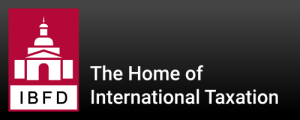Author: Lejeune, I.
In this Column, the author wishes for a harmonized Union VAT system to drive growth in the single market and reduce disputes. She provides suggestions to be considered by the EU Commission, Member States, EU Parliament’s FISC, Subcommittee on Tax Matters and the EU Commission’s VAT Expert Group to improve the VAT system in the European Union.
Waste Reduction and VAT: A Complex Interplay
Author: Echevarría Zubeldia, G.
The European Union’s push for waste reduction highlights a complex interplay between sustainability and VAT rules. In this column, the author analyses the ECJ case in Y KG, which reveals how rigid VAT regulations, such as the classification of free transfers of heat as taxable deemed supplies, can discourage environmentally friendly practices, emphasizing the need for VAT frameworks that align with circular economy goals.
VAT Treatment of Consumer-to-Consumer Supplies of Residential Premises in China
Author: Peacock, C.
In China, the sale of larger and more expensive homes in Beijing, Guangzhou, Shanghai and Shenzhen which had been owned by individuals for two years or more was previously subject to VAT. From 1 December 2024, this is no longer the case. In this article, the author explains that this measure is expected to reduce the cost of housing and stimulate the housing market.
Belgian VAT Exemption for Transactions on Cryptocurrencies: Scope of Application and Boundaries
Author: Tourmous, K
For several years now, transactions involving crypto assets have been flourishing, whether they involve buying or selling cryptocurrencies or non-fungible tokens (NFTs) or paying for the delivery of goods or services via cryptocurrencies. In this article, the authors provide an overview and address some of the issues of the Belgian VAT treatment applicable to transactions on cryptocurrencies.
VAT Registration Thresholds in Europe
Author: Annacondia, F.
As is traditional in the sixth issue of each year, in this issue of the International VAT Monitor an overview is presented of the VAT registration thresholds in most European (both EU and non-EU) countries, applicable in October 2024 and supplemented with announced amendments entering into force on 1 January 2025.
Author: Bancalari, M.; Manica, M.
On 16 March 2023, the Italian government was delegated to perform a substantial revision of the Italian VAT Decree by 29 August 2025 and a formal reorganization by 31 December 2025. The revision is aimed at making the Italian VAT Decree fully harmonized with European VAT principles in light of the criteria provided by the Court of Justice of the European Union, while the reorganization is aimed at granting more efficient accessibility to the Italian VAT legislation.
Brazilian VAT/GST Reform: Digital Platform’s Collection Liability
Author: Brazuna, J.L. Ribeiro
The author’s objective in this article is to outline the potential obligations to be imposed on digital platforms as an effect of the Brazilian VAT/GST reform, passed in 2023 and currently under regulation by the Congress, as well as to point out some key points that should be improved during this legislative process.
VAT On Imported Services In Africa – Why Consumption And Reverse Charge Concepts Remain Crucial
Author: Habaasa, A.
As exports and imports of services continue to grow globally, Value Added Tax (VAT) on imported services has also taken a centre stage in most countries. Unlike goods, determining the place of consumption for services is often a contentious issue and a source of VAT controversy in many countries. In resolving these controversies, African courts, with a few exceptions, have established a visible criterion for determining the place of consumption of cross-border service transactions that aligns with the OECD International VAT/GST Guidelines. Where consumption is not at issue, most African countries have opted to deploy a reverse charge mechanism blended with a “register and comply” requirement for the foreign supplier in order to administer and collect VAT on the foreign supply (imported service). In this article, the author argues that African countries should deploy a reverse charge mechanism for B2B transactions and only use a “register and comply” requirement by non-residents for B2C services.
Click on the logo to visit the website
Latest Posts in "World"
- AI In Tax: Common Pitfalls That Keep Projects From Taking Off
- Worldwide Upcoming E-Invoicing mandates, implementations and changes – Chronological
- Understanding VAT Implications for Borderless Workers: Key Considerations for Global Mobility
- OECD Report 2025: Tax Reforms Target Health Costs, Aging, and Sustainability with New Measures
- 7 Essential Steps for International VAT Registration and Compliance Success
















